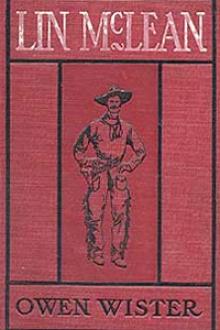The Virginian: A Horseman of the Plains, Owen Wister [best e books to read txt] 📗

- Author: Owen Wister
Book online «The Virginian: A Horseman of the Plains, Owen Wister [best e books to read txt] 📗». Author Owen Wister
So I was passing that way also, walking for the sake of ventilation from a sleeping-car toward a bath, when the language of Colonel Cyrus Jones came out to me. The actual colonel I had never seen before. He stood at the rear of his palace in gray flowery mustaches and a Confederate uniform, telling the wishes of his guests to the cook through a hole. You always bought meal tickets at once, else you became unwelcome. Guests here had foibles at times, and a rapid exit was too easy. Therefore I bought a ticket. It was spring and summer since I had heard anything like the colonel. The Missouri had not yet flowed into New York dialect freely, and his vocabulary met me like the breeze of the plains. So I went in to be fanned by it, and there sat the Virginian at a table, alone.
His greeting was up to the code of indifference proper on the plains; but he presently remarked, “I'm right glad to see somebody,” which was a good deal to say. “Them that comes hyeh,” he observed next, “don't eat. They feed.” And he considered the guests with a sombre attention. “D' yu' reckon they find joyful digestion in this swallo'-an'-get-out trough?”
“What are you doing here, then?” said I.
“Oh, pshaw! When yu' can't have what you choose, yu' just choose what you have.” And he took the bill-of-fare. I began to know that he had something on his mind, so I did not trouble him further.
Meanwhile he sat studying the bill-of-fare.
“Ever heard o' them?” he inquired, shoving me the spotted document.
Most improbable dishes were there,—salmis, canapes, supremes,—all perfectly spelt and absolutely transparent. It was the old trick of copying some metropolitan menu to catch travellers of the third and last dimension of innocence; and whenever this is done the food is of the third and last dimension of awfulness, which the cow-puncher knew as well as anybody.
“So they keep that up here still,” I said.
“But what about them?” he repeated. His finger was at a special item, FROGS' LEGS LA DELMONICO. “Are they true anywheres?” he asked. And I told him, certainly. I also explained to him about Delmonico of New York and about Augustin of Philadelphia.
“There's not a little bit o' use in lyin' to me this mawnin',” he said, with his engaging smile. “I ain't goin' to awdeh anything's laigs.”
“Well, I'll see how he gets out of it,” I said, remembering the odd Texas legend. (The traveller read the bill-of-fare, you know, and called for a vol-au-vent. And the proprietor looked at the traveller, and running a pistol into his ear, observed, “You'll take hash.”) I was thinking of this and wondering what would happen to me. So I took the step.
“Wants frogs' legs, does he?” shouted Colonel Cyrus Jones. He fixed his eye upon me, and it narrowed to a slit. “Too many brain workers breakfasting before yu' came in, professor,” said he. “Missionary ate the last leg off me just now. Brown the wheat!” he commanded, through the hole to the cook, for some one had ordered hot cakes.
“I'll have fried aiggs,” said the Virginian. “Cooked both sides.”
“White wings!” sang the colonel through the hole. “Let 'em fly up and down.”
“Coffee an' no milk,” said the Virginian.
“Draw one in the dark!” the colonel roared.
“And beefsteak, rare.”
“One slaughter in the pan, and let the blood drip!”
“I should like a glass of water, please,” said I. The colonel threw me a look of pity.
“One Missouri and ice for the professor!” he said.
“That fello's a right live man,” commented the Virginian. But he seemed thoughtful. Presently he inquired, “Yu' say he was a foreigner, an' learned fancy cookin' to New Yawk?”
That was this cow-puncher's way. Scarcely ever would he let drop a thing new to him until he had got from you your whole information about it. So I told him the history of Lorenzo Delmonico and his pioneer work, as much as I knew, and the Southerner listened intently.
“Mighty inter-estin',” he said—“mighty. He could just take little old o'rn'ry frawgs, and dandy 'em up to suit the bloods. Mighty inter-estin'. I expaict, though, his cookin' would give an outraiged stomach to a plain-raised man.”
“If you want to follow it up,” said I, by way of a sudden experiment, “Miss Molly Wood might have some book about French dishes.”
But the Virginian did not turn a hair. “I reckon she wouldn't,” he answered. “She was raised in Vermont. They don't bother overly about their eatin' up in Vermont. Hyeh's what Miss Wood recommended the las' time I was seein' her,” the cow-puncher added, bringing Kenilworth from his pocket. “Right fine story. That Queen Elizabeth must have cert'nly been a competent woman.”
“She was,” said I. But talk came to an end here. A dusty crew, most evidently from the plains, now entered and drifted to a table; and each man of them gave the Virginian about a quarter of a slouchy nod. His greeting to them was very serene. Only, Kenilworth went back into his pocket, and he breakfasted in silence. Among those who had greeted him I now recognized a face.
“Why, that's the man you played cards with at Medicine Bow!” I said.
“Yes. Trampas. He's got a job at the ranch now.” The Virginian said no more, but went on with his breakfast.
His appearance was changed. Aged I would scarcely say, for this would seem as if he did not look young. But I think that the boy was altogether gone from his face—the boy whose freak with Steve had turned Medicine Bow upside down, whose other freak with the babies had outraged Bear Creek, the boy who had loved to jingle his spurs. But manhood had only trained, not broken, his youth. It was all there, only obedient to the rein and curb.
Presently we went together to the railway yard.
“The Judge is doing a right smart o' business this year,” he began, very casually indeed, so that I knew this was important. Besides bells and coal smoke, the smell and crowded sounds of cattle rose in the air around us. “Hyeh's our first gather o' beeves on the ranch,” continued the Virginian. “The whole lot's shipped through to Chicago in two sections over the Burlington. The Judge is fighting the Elkhorn road.” We passed slowly along the two trains,—twenty cars, each car packed with huddled, round-eyed, gazing steers. He examined to see if any animals were down. “They ain't ate or drank anything to speak of,” he said, while the terrified brutes stared at us through their slats. “Not since they struck the railroad they've not drank. Yu' might suppose they know somehow what they're travellin' to Chicago for.” And casually, always casually, he told me the rest. Judge Henry could not spare his foreman away from the second gather of beeves. Therefore these two ten-car trains with their double crew of cow-boys had been given to





Comments (0)